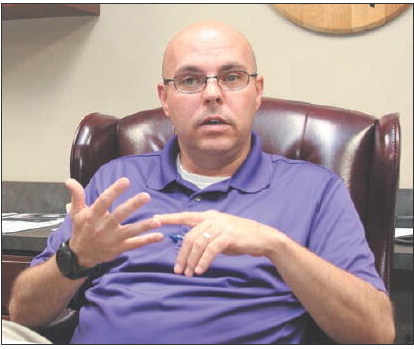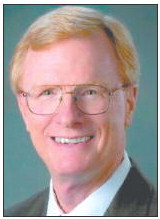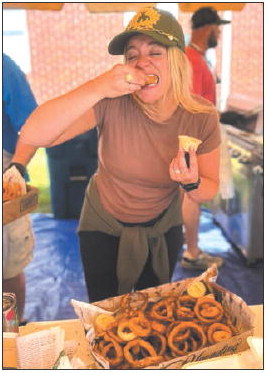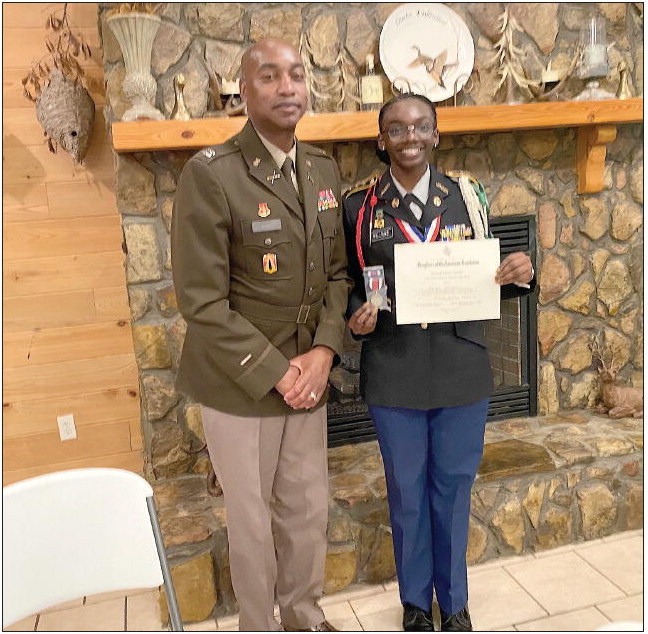Kayongo Inspires Business Summit Attendees
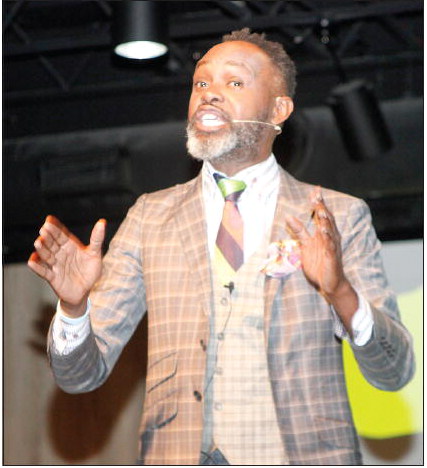

mrandolphadvance@gmail.com
Entrepreneur and Human Rights Enthusiast Derreck Kayongo stole the show at the annual Greater Vidalia Chamber Summit was held on Thursday, September 28, as he inspired audiences with his lifechanging story about creating a nonprofit organization from scratch.
Kayongo was born in Uganda, but fled the nation after a civil war broke out. He recalled the event, sharing that one day, while he was still a child, a soldier entered his family’s apartment and forced them to gather with other residents of his Ugandan village at a central meeting place. “In Swahili, [the soldier] said ‘Get out of your apartment right now,’” Kayongo told the audience. “He was so forceful and so rude that we knew if we didn’t get out of the apartment, he actually may kill us.”
The soldiers grouped the villagers up, and the men’s leader told the villagers that he was on a mission to find out what individual had killed 2 of his soldiers the night before. “He said, ‘Last night, 2 of my soldiers were killed, and I need to find out who did it. So, what we’re going to do is we are going to have a firing squad until I find out who killed them,’” Kayongo shared.
“In any civilization, what happens when a crime of this magnitude is completed? You investigate the crime; you police that crime. Well, he did not,” Kayongo recalled. “He picked out 4 people at random and brought them to the front. He asked the question one more time and then, he pulls out his pistol and shoots all 4 of them at once – pow, pow, pow, pow. The chaos that ensued as mothers were screaming and everyone was falling all over each other was horrid because all of the sudden, we knew he was serious.”
Kayongo said this practice continued another round, as 4 more random villagers became casualties of war. “He yelled, ‘Everybody simmer down! We are going to do this all day until we figure this out,’” he remarked. “He picked out another 4, and as he picked out those 4, neighbors started turning to each other, saying, ‘He picked you.’ Can you imagine right now your neighbor, who you’ve known, picking you out and offering you to be executed? It is amazing what people will do when they’re caught between a rock and a hard place. We’re all nice until that big moment happens.”
He continued, “Before they could pick another 4, a young man in the very back rose his hand ever so gently and said, ‘I did it.’ As I turned back to see who this young man was, he was a visitor to the village – there is no way he could have committed that crime. They brought that young man to the front and they shot him after this banter between the two of them. I can still feel this young man drop to the ground and shake to his very death. At that very point, I remember thinking to myself, ‘My goodness. What is it about adults that make them not understand the very value of life?’” According to Kayongo, the soldiers, having felt they accomplished their mission, then left and the leader told the villagers, “Thank you so much for your cooperation, I hope this doesn’t happen again – because if it does, I will be back.”
This turmoil was just the beginning of the civil war in Uganda, which stripped Kayongo and his family of the life that they had worked so hard to build in the country.
Kayongo informed the audience that both his parents had begun from scratch to create successful careers for themselves. His mother, who began as a teacher, taught herself to sew wedding dresses and went own to run the largest David’s Bridal store in Uganda. His father found success in several industries, including printing, banking, and construction – yet, it was in the soapmaking factory, which was built by Kayongo’s father himself – in which he found the most achievement.
“I really grew up around an incredible amount of success, and these two people who were – wow, just amazing,” Kayongo emphasized. “One of the things that we forget about human beings is that having a great father is an amazing thing – especially if the father is purpose-driven and has an incredible sense of existence. But, on the other hand, having an incredible mother is such stabilization that there’s no medication for it. You cannot go anywhere to get the stability that a mother can bring to a child.”
He said that watching his parents work towards success had made him ponder the concept. “Success is important in community. You hear about money all the time,” Kayongo remarked. “Success is about creating a name. But what happens if we take all that away and take you back to zero and dehumanize you? Would you still have the same character and gumption that you displayed when everything was glorious? To see my mom and dad become refugees was unbelievable.”
Kayongo told the audience that he and his family, along with other Ugandan natives, were given 90 days to leave the country. “They had been there for 100 years,” he stressed. “It’s crazy to think about.”
Kayongo’s family fled to Kenya, where they met a woman who could bring him to America. “They put me in the hands of an American woman from Pittsburgh to raise me, then [my father] goes back [to Uganda] to fight in the war because he said part of character is to not just say how horrible things are, but to do something about it – that’s what leadership is all about. When disaster happens, you don’t run. You stay and do something about it,” he explained.
That Americanwas Marge Campbell, a missionary who was raising young kids from refugee situations in Kenya. “She was such an investor in me,” Kayongo said. “She left the whole place of Pittsburgh to come to a refugee place and take care of us.”
After having been raised by Campbell in Kenya, Kayongo came to the United States – specifically Philadelphia – for college. Upon arrival, he stayed in a hotel, which first sparked his idea for the Global Soap Project.
“It was the first time I had stayed at an elegant hotel,” he recalled. “I walk into the bathroom and there are three bars of soap – hand soap, facial soap, and bath soap. What is the difference in them? Nothing – Americans are just boujee. Everywhere else around the world, we just use regular soap.”
Having never experienced that sort of situation, and knowing the value of soap because of his father’s time as a soap maker, Kayongo began taking the soap and keeping it. After 3 days, he felt that he could not pay for the soap, so he went to the hotel concierge to speak with him about the situation. “I walk up to him and say, ‘I have been stealing soap.’ He said, ‘What?’ and I explained that I had been stealing soap and couldn’t afford it – can you just take it back to housekeeping so they don’t charge me for it?” he told the audience. “[The concierge] busted out laughing, and began teasing me. We laughed, and he told me, ‘Derreck, don’t worry about it. It’s part of the bill, so we have already factored it in.’”Kayongo then asked the man what happened to soap that wasn’t completely used. “He said, ‘We throw those out. It’s partially used – no one is going to use that,’” Kayongo shared. “Once you open the wrapper, that’s it.”
He returned to his room, and it was there the idea struck to find a way to utilize the leftover soap by recycling it and making it available to less fortunate countries. “2.6 million bars of soap are thrown away every single day,” he emphasized. “If you are Derreck, coming into the U.S. from Uganda, you can look at that [statistic] and say two things – you can either say how wasteful Americans are or you will remember the conversation you had with your dad before you came to the U.S.”
Kayongo continued, “He said ‘America is an interesting country. It is only around 260 years old. Look what they have done in only 260 years. It is amazing what has been done here. You had huge conversations about how to do things when you created this country. You had the feminist movement, the financial movements – so many movements. But, in that conversation, you decided that this country was going to be great, big, and important. You are now the strongest country in the world. Why? Because people like myself come here and don’t complain about the country, but construct [solutions.] If you are here with intent on staying here, you have to confront the very difficult conversations we need to have – it is up to you. My father told me, ‘If you are going to be in the U.S., you have to bring something of importance to the country.’” He began work on his idea, as he overcame several challenges through innovative thinking. When challenged to find a way to remove the bacteria off of the recycled soap without changing the chemical compound of the soap, Kayongo decided to vaccum seal the soap. “Boiling the soap would change the soap’s chemical makeup. Yet, bacteria are living things. When you put them in a vacuum, they cannot survive,” he explained.
Kayongo also worked to build 4 factories – one each in Hong Kong, Italy, Las Vegas, and Orlando. He got the soap transported for free by utilizing trucks that would normally leave the cities empty and offering them a tax incentive.
The operation currently works through volunteers who give their time to repurpose and create soap to provide to 32 countries and to several students in Africa, as well. “It transformed many young girls’ lives,” Kayongo remarked. “Whereas before, they would drop out of school because of being picked on for hygiene issues, they are now able to stay and get the education they deserve.’
Each box of soap given to a family provides the family with enough soap for a year, as Kayongo said it is important not to just give once but to be consistent.
“Here’s where leadership becomes a separating thing: some of us think we are leaders because we have been given that position or been somewhere a long time, but we are not innovators and entrepreneurs on the job,” he emphasized. “We have so much invested in us that we should really be vigilant about life. We have 1 chance in life – this is it.”
Kayongo encouraged the audience to break outside of the box to be the most effective person they could be in whatever they chose to do. “Leaders are observers. They notice things, and they choose to find solutions for them. They use what they observe innovatively and find new ways to accomplish ideas,” he stressed.
He added, “What is your legacy? Here is my advice: don’t seek perfection. Seek balance. Seek consistence. Seek justice. Seek passion. Seek a cause for humanity, and your life shall have meaning.”
Other Speakers
Though Kayongo was the keynote speaker at the event, University of Georgia Small Business Center Consultants Alyssa Foskey and Nadia Osman addressed the crowd about other aspects of business, such as customer service and social media presence.
Foskey advised the attendees to ponder how their business could improve customer service to both new and loyal customers. She emphasized the need for business leaders to determine what constituted good customer service and great customer service, and how they could possibly exceed consumer expectations within their business. Foskey used the infamous telephone game, in which a statement is passed down a line of people to see if the ending statement matches that which was first shared, to illustrate the importance of paying attention to detail and being engaged with your consumer, as she explained that poor customer service could cost a business their brand reputation, customer loyalty, and even their bottom dollar.
Osman, who filled in for previously-scheduled Melissa Furman unable to attend due to illness, discussed the differing platform audiences and successful forms of media found on each social media platform, including Facebook, X (Twitter), Instagram, LinkedIn, Snapchat, Tiktok, and Pinterest. She explained that social media often served as a “giant science experiment,” meaning the media platforms change daily, so the content must also follow that same flow of change. She emphasized the importance of partnering social media marketing with other things, such as outside advertising and community engagement, and advised the audience to proofread posts, shorten links, tag other accounts, and encourage comments.
“This has been a life changing event for a lot of people the past two years,” Greater Vidalia Chamber Past Chairman John Koon commented. “I am so excited to see the effects that this year’s speakers bring.”
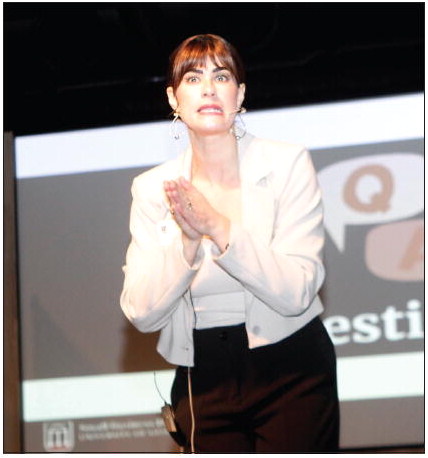
ENGAGING THE COMMUNITY – University of Georgia Small Business Center Consultant Nadia Osman stressed the importance of blending social media presence with presence in the community during her session at the Greater Vidalia Summit.Photo by Makaylee Randolph
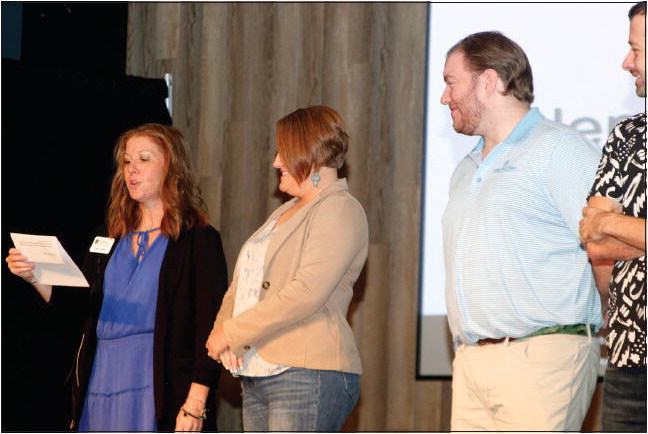
ATTENTION TO DETAIL – University of Georgia Small Business Center Consultant Alyssa Foskey used the traditional Telephone Game to emphasize to the audience the need to pay attention to small details.Photo by Makaylee Randolph




